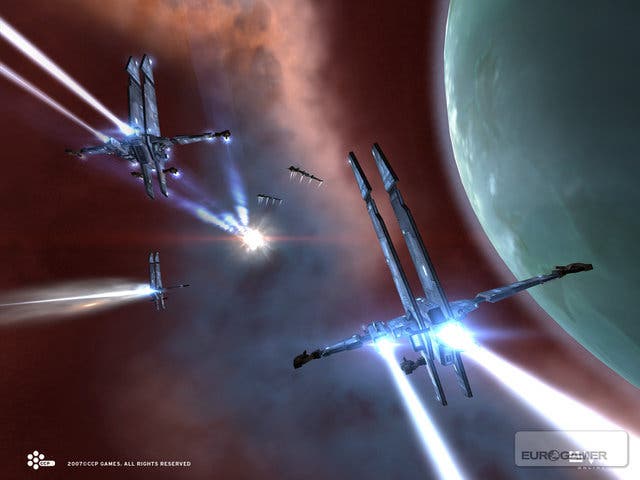Gold Trading Exposed: The Developers
The Carrot and the Stick?
"This systems allows players to expand the EVE universe by effectively subsidising other players with game time," said CCP's Ned Coker. "Hence, the player experience is not negatively affected by this trade, but the effect is positive since more legit players can now play the game. All you need to play EVE is some ISK."
CCP also introduced EVE time cards (ETC), a means of paying for a subscription through the in-game purchase of the cards using ISK. "This allows more advanced players to generate the needed ISK to pay for their characters without any real money," said Coker. "The ETC sellers are also players and they gain in-game ISK in trade for the purchase and resale of the ETCs."
Similarly, over in EverQuest, SOE has introduced 'Station Exchange', which Wilcox called an "official auction service that provides players a secure method of buying and selling the right to use in-game coin, items and characters in accordance with SOE's license agreement, rules and guidelines." In March 2008, Station Exchange was moved across to Live Gamer and its Live Gamer Exchange service. However, this is only available on two EverQuest II servers right now.
Changes and the Future
Could we one day see MMO developers and gold sellers co-operating and working together? "Benjamin", marketing manager for China's largest gold seller, SwagVault, is not optimistic - yet.
"Personally, I don't think gold sellers can cooperate with online game publishers under the current mode. The most probable trend is that the games become 'free-to-play', and the operators sell gold or other in-game items by themselves. There are a lot of so-called F2P MMOs, and they mainly get revenue from selling in-game items.
"One of the most famous examples is a Chinese online game developer and operator - Giant Interactive Group, they got listed in the NASDAQ by selling in-game items in ZhengTu, a game they developed and published in China. So I don't think the game publishers will be willing to share the cake with the gold sellers.
"However, the RMT market will exist forever. Actually, RMT involves not just in-game currency selling, but also involves power-levelling services, items and accounts trading, and it's impossible that the publishers provide everything the gamers desire. So," he chuckles, 'Where there is demand, there is market!'"
According to Vili Lehdonvirta of the Helsinki Institute for Information Technology, an expert on virtual consumerism, real money trading is now well-established outside of the MMO sphere.
"Several Korean online games successfully sell performance-based items to users," he says in his recent report Virtual item sales as a revenue model: identifying attributes that drive purchase decisions. In Kart Rider, he mentions, players can purchase faster vehicles and items that improve their chances of winning by hindering other players.

CCP's Coker suggests that the industry is still young, and very much coming to terms with its fast-evolving user base (us, the players): "It's maturing quickly. Companies will find ways to deal with RMT activity and they will do so in different manners, depending on the initial game design. We do not foresee that CCP will go down the same road as EverQuest, but we will have innovative new ways of dealing with the core of the problem. One such innovative solution is the PLEX system."
For Brad Wilcox at Sony, the problem of 'gold selling' remains far more elemental. "I just want to point out," he says, "that the only reason that this problem exists is that people purchase the gold, items, accounts or services from these [gold selling] companies. If no-one did it they would not be in business. If you purchase an item or service from one of these companies, you are as guilty as those that are 'botting', 'farming' or 'spamming'."
Just as I was finishing writing this story, another friend from a long-established role-playing guild on my realm in World of Warcraft posted another tale of lament. Their guild leader had been hacked - twice. When the players tried to whisper the spammer who'd taken over their beloved leader, all they got in response was: "10k gold". The second response from him was: "DELETEEEEE". Five seconds later, four realms' worth of accounts had been cleared.
It's a sobering experience. And one still all-too-common in the virtual worlds we now so increasingly inhabit.
Nick Ryan is a journalist and producer, author of Homeland: Into a World of Hate (Mainstream).







